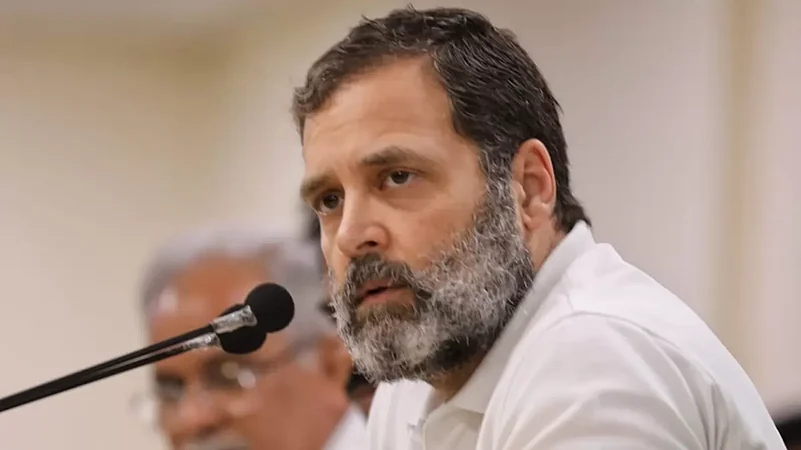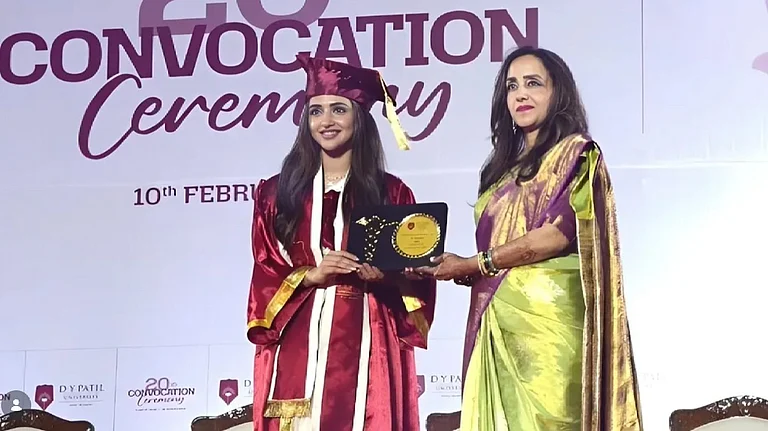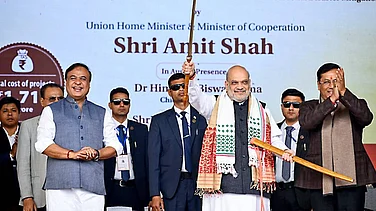The Bharatiya Janata Party 's devious backward caste twist to the conviction and disqualification of Congress leader Rahul Gandhi over his comments on "Modi" brings back memories of a similar episode involving the two sides nine years ago.
The high-pitched 2014 Lok Sabha election campaign had hit its peak when Congress leader Priyanka Gandhi Vadra lost her cool over a remark about her father, Rajiv Gandhi, by Narendra Modi, who was then Gujarat Chief Minister and the BJP's prime ministerial candidate.
The exchange of verbal attacks started after Modi, while tearing at the legacy of the Congress' ruling family, in particular Rajiv Gandhi, in a rally in Uttar Pradesh remarked that Rahul Gandhi was following the path of his father in practising the “politics of anger.”
Vadra, the Congress' star campaigner in the election, lashed back at Modi. She accused him of insulting her "martyred" father "on the soil of Amethi." The Uttar Pradesh constituency considered a Nehru-Gandhi pocketborough was then represented by her brother Rahul Gandhi.
Vadra appealed voters to give a befitting reply to the BJP over its “neech rajneeti” or lowly politics (as translated into English), a very commonly-used political phrase used by politicians to deride their adversaries.
The Congress leader’s barb on Modi came in response to him taking a personal swipe at her father and brother Rahul Gandhi, who was then Congress vice-president.
However, in a shrewd manoeuvre, Modi twisted the debate from dynasty to caste.
In his following speeches in the campaign, Modi, who had been vocally projecting his humble ‘chai-wala’ background, aggressively raked up his backward caste identity. Modi conveniently interpreted the word “neech” as being an assault on his “low-caste” identity. The Congress’ clarifications fell on deaf ears.
Other Backward Classes (OBCs) are the single largest voting bloc in UP, easily numbering above 40 per cent of the state’s population. By projecting himself as one of them, Modi attempted to break decades-old voting patterns in which the Samajwadi Party and the Bahujan Samaj Party had been the prime beneficiaries of the support of the backward castes despite the BJP’s Hindutva outreach in the state, a landmark of which was the Ram Janmabhoomi movement.
At a rally in Doomariganj in Purvanchal in May 2014, Modi said: “Sometimes they ask how can a tea-seller run the country. Other times they wonder how a person belonging to a 'neeche jaati' got success in politics. I have sold tea not the country." In the same speech, he also said: “Did I insult anyone despite being born in backward caste? Just because we belong to the lower strata does it mean we can be abused like this? You can insult Modi as much as you like, you can hang him. But do not insult my fellow lower caste Indians.”
Smriti Irani, the actress -turned-politician eventually lost that election to Gandhi in Amethi although she drastically reduced his margin. In 2019, she exacted revenge on him and dethroned the Gandhi-scion from Amethi despite him getting the support of regional heavyweights Samajwadi Party and Bahujan Samaj Party. But that's a different story.
Nine years is a long time in Indian politics. The script and narratives change multiple-times. However, some strategies are everlasting. By that I mean the ever-fertile ground of caste identity, the goldmine of political and electoral mobilization in the country.
Recent developments over the disqualification of Rahul Gandhi as a Lok Sabha member brings back memories of how the BJP has over the past decade strongly tried to link Modi to the numerically-powerful OBC communities. So far, it has brought great rewards. The BJP has been successful in planting Modi as a prominent OBC voice and shrinking the space for traditional backward caste-based non-BJP socialist leaders.
Last week, a court in Surat, Gujarat, convicted Gandhi under defamation and sentenced him to two years in prison for a 2019 speech in Karnataka in which he referred to thieves having the name Modi. While linking Prime Minister Modi to fugitive businessmen facing serious charges of financial wrong-doing, Gandhi had in an election rally reportedly said: "How come all the thieves have Modi as the common surname.”
After the conviction, Gandhi was swiftly disqualified by Parliament, triggering a legal and political debate over the quantum of punishment served to him as well as its timing.
However, what also stood out was the political spin the ruling BJP tried to give the matter. The BJP has tried to project that Gandhi’s speech attacking Modi or Modis was an attack not on stained industrialists but on an entire community, the OBCs.
Taking a dig at Gandhi, Jagat Prakash Nadda, the national president of BJP, tweeted on March 24: “By comparing OBC communities to thieves, Mr. @RahulGandhi has shown a pathetic and casteist mindset. However, his latest tirade is not surprising. For the last many years he has always reduced levels of political discourse.”
While convicting Gandhi, on the complaint of a BJP MLA Purnesh Modi, the Surat court said that he could have limited his speech to Prime Minister Modi and stopped after comparing him to Nirav Modi, Vijay Mallya, Mehul Choksi, and Anil Ambani, but that he "intentionally" made a statement that hurt all individuals carrying the Modi surname, said a report quoting the 168-page order.
The Congress, jn response, has accused the BJP of trying to add another element of distraction to the issue of economic offenders being protected by the government, by giving it an OBC twist.
“This is not a matter of OBCs. This is about the relation between Narendra Modiji and Adaniji,” Rahul Gandhi told reporters at a press conference he held in New Delhi following his disqualification.
At the Sankalp Satyagraha called by the Congress on March 26 at Rajghat in support of Gandhi, the OBC question was also raised. “Is Nirav Modi OBC? Mehul Chouksey is OBC? Lalit Modi is OBC?” thundered Congress president Mallikarjun Kharge as he slammed the BJP’s narrative.
Congress MP Shashi Tharoor argued that the BJP’s charge was preposterous and said that “no one imagines that Lalit Modi and Nirav Modi,” two of the three Modis referred to by Gandhi in his 2019 speech, are anything that qualifies as backward.
“They are not backward by caste. They are living luxurious exiles in London. It stretches common sense to the breaking point to say that these two people who have taken ill-gotten gains and are fugitives of status in a foreign land and living in the lap of luxury...and pointing out that is an assault on OBCs,” Tharoor told a TV channel.
The previous Lok Sabha election witnessed this OBC-background debate play out in UP, where the BJP has made immense gains in its campaign to seize power in Delhi. Modi, a second-term MP from Varanasi, in 2019 projected himself as a "most backward caste" person when a united Opposition in the politically-significant state questioned his OBC credentials.
Will Rahul Gandhi's conviction over his comments on "Modi" set the stage for a similar onslaught by the BJP in 2024?





















